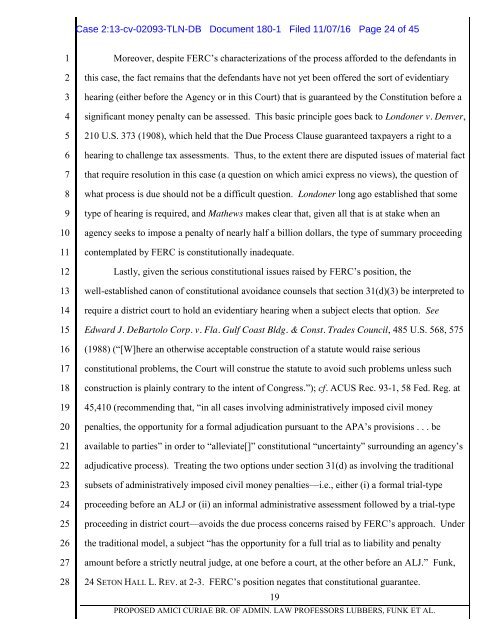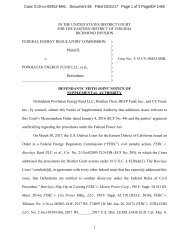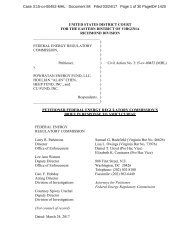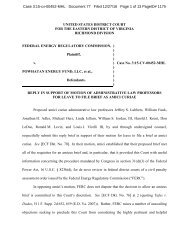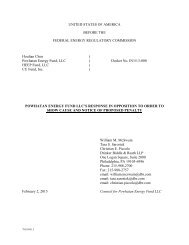FERC-v.-Barclays-180-1-Proposed-Brief
FERC-v.-Barclays-180-1-Proposed-Brief
FERC-v.-Barclays-180-1-Proposed-Brief
You also want an ePaper? Increase the reach of your titles
YUMPU automatically turns print PDFs into web optimized ePapers that Google loves.
Case 2:13-cv-02093-TLN-DB Document <strong>180</strong>-1 Filed 11/07/16 Page 24 of 45<br />
1<br />
2<br />
3<br />
4<br />
5<br />
6<br />
7<br />
8<br />
9<br />
10<br />
11<br />
12<br />
13<br />
14<br />
15<br />
16<br />
17<br />
18<br />
19<br />
20<br />
21<br />
22<br />
23<br />
24<br />
25<br />
26<br />
27<br />
28<br />
Moreover, despite <strong>FERC</strong>’s characterizations of the process afforded to the defendants in<br />
this case, the fact remains that the defendants have not yet been offered the sort of evidentiary<br />
hearing (either before the Agency or in this Court) that is guaranteed by the Constitution before a<br />
significant money penalty can be assessed. This basic principle goes back to Londoner v. Denver,<br />
210 U.S. 373 (1908), which held that the Due Process Clause guaranteed taxpayers a right to a<br />
hearing to challenge tax assessments. Thus, to the extent there are disputed issues of material fact<br />
that require resolution in this case (a question on which amici express no views), the question of<br />
what process is due should not be a difficult question. Londoner long ago established that some<br />
type of hearing is required, and Mathews makes clear that, given all that is at stake when an<br />
agency seeks to impose a penalty of nearly half a billion dollars, the type of summary proceeding<br />
contemplated by <strong>FERC</strong> is constitutionally inadequate.<br />
Lastly, given the serious constitutional issues raised by <strong>FERC</strong>’s position, the<br />
well-established canon of constitutional avoidance counsels that section 31(d)(3) be interpreted to<br />
require a district court to hold an evidentiary hearing when a subject elects that option. See<br />
Edward J. DeBartolo Corp. v. Fla. Gulf Coast Bldg. & Const. Trades Council, 485 U.S. 568, 575<br />
(1988) (“[W]here an otherwise acceptable construction of a statute would raise serious<br />
constitutional problems, the Court will construe the statute to avoid such problems unless such<br />
construction is plainly contrary to the intent of Congress.”); cf. ACUS Rec. 93-1, 58 Fed. Reg. at<br />
45,410 (recommending that, “in all cases involving administratively imposed civil money<br />
penalties, the opportunity for a formal adjudication pursuant to the APA’s provisions . . . be<br />
available to parties” in order to “alleviate[]” constitutional “uncertainty” surrounding an agency’s<br />
adjudicative process). Treating the two options under section 31(d) as involving the traditional<br />
subsets of administratively imposed civil money penalties—i.e., either (i) a formal trial-type<br />
proceeding before an ALJ or (ii) an informal administrative assessment followed by a trial-type<br />
proceeding in district court—avoids the due process concerns raised by <strong>FERC</strong>’s approach. Under<br />
the traditional model, a subject “has the opportunity for a full trial as to liability and penalty<br />
amount before a strictly neutral judge, at one before a court, at the other before an ALJ.” Funk,<br />
24 SETON HALL L. REV. at 2-3. <strong>FERC</strong>’s position negates that constitutional guarantee.<br />
19<br />
PROPOSED AMICI CURIAE BR. OF ADMIN. LAW PROFESSORS LUBBERS, FUNK ET AL.


